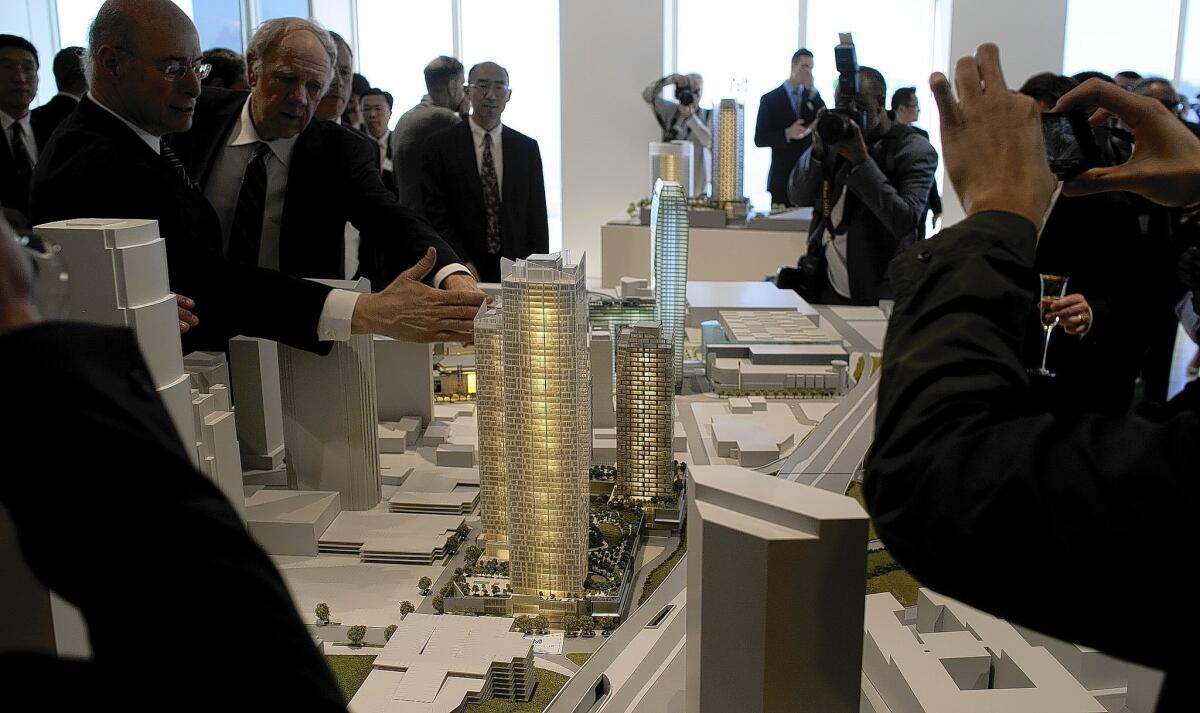L.A. should be more selective with hotel tax breaks, some say

Nearly a decade ago, lawmakers in Los Angeles took an aggressive step to boost the city’s languishing Convention Center, granting tens of millions of dollars in tax breaks to spark construction of a 54-story hotel nearby.
The strategy worked, bringing 1,000 new rooms to the sleepy neighborhood. Within a few years, hotel developers in the area had secured as much as $508 million in tax benefits over the coming decades.
But as downtown continues to boom, some inside and outside City Hall say Los Angeles should be much more selective in giving out tax breaks to lure new hotels. With the City Council poised to consider a new crop of downtown hotel subsidies one high-profile project in particular is being seen as a test case.
Just north of L.A. Live, a developer wants to erect a 19-story hotel and 38-story residential tower on an empty lot next to the 110 Freeway. Greenland US Holding Inc., leading the Metropolis development, says it needs as much as $92 million in financial help to fill a budget gap in the project, according to a report prepared for the council.
Greenland held a splashy groundbreaking for the project two months ago. Councilman Jose Huizar and foreign dignitaries gave speeches as waiters served champagne.
Weeks later, however, the top executive at the city’s Convention Center issued a memo warning that Metropolis offers too few benefits to warrant city help.
Convention Center Executive Director Robert “Bud” Ovrom, although a longtime champion of city subsidies, questioned whether L.A. should provide the taxpayer support in this case. Greenland is planning only 350 hotel rooms, even though the city has granted permission to develop nearly five times that amount, he said.
Financial help might make sense, Ovrom said, if Metropolis offered 900 rooms, a number that would help the city attract more national conventions and mean more local jobs.
“If the city does not provide any subsidy,” he wrote in his memo, “they will probably still build exactly the same thing.”
Greenland, whose parent company is based in Shanghai, declined requests for comment on Ovrom’s assertions. In a general statement, a company spokesman said “it has still not been determined whether the hotel will be economically feasible.”
Metropolis is not the only project whose request for financial help is under review. The council voted in December to explore taxpayer support for The Bloc, a $150-million renovation of downtown’s Macy’s Plaza mall and the adjacent Sheraton Hotel. A plan to have city officials consider a subsidy for a proposed 450-room hotel project across from L.A. Live comes up for a council vote next week.
One newcomer to the council also says L.A. needs to take a fresh look at its hotel tax breaks.
Councilman Curren Price, who heads the city’s economic development committee, said hotel subsidies still have a role to play. But with upscale restaurants, high-end retail stores and hundreds of apartments going up downtown, the city needs to reexamine the amount of help being provided, he said.
“We want to be sure we get the rooms we need,” said Price, whose district includes the Convention Center. “But we’re not trying to unduly enrich corporations at the expense of the public services we desperately need in the city.”
Ovrom and other city officials have long argued that subsidies are needed to add 4,000 rooms to the neighborhood surrounding the Convention Center. That number would help the city compete against other West Coast destinations, such as Anaheim and San Diego, they said.
Some other major urban centers provide financial aid to lure hotel builders. In Chicago, eight projects have received subsidies in the last decade. In Philadelphia, 13 new hotels have been approved with taxpayer help. Some jurisdictions, including Phoenix and Baltimore, have gone so far as to develop their own hotels near their convention centers.
A major exception is San Francisco, a tourism powerhouse that had the third-highest hotel revenue per room in the nation last year. Three hotels have been built in that city over the last decade, none with city financial assistance, according to officials there.
In Los Angeles, officials have relied heavily on one strategy for attracting new hotels: letting developers keep a portion of the tax revenue their projects generate for two to three decades. That money — which typically includes portions of sales, occupancy, utility and property tax revenues — would otherwise go to the general fund, which pays for basic services such as the police and fire departments.
The first of those deals was struck in 2005, when developer Anschutz Entertainment Group received permission to keep up to $270 million of the tax revenues generated by L.A. Live over 25 years. Two years later, a similar agreement was reached for the Grand Avenue project, which envisioned condominiums and a five-star hotel across from the Walt Disney Concert Hall. That project stalled during the recession and the deal is being reexamined.
Developers of the two most recent downtown hotel projects — the Wilshire Grand and a pair of Marriott hotels on Olympic Boulevard — were allowed to keep an amount equal to half the taxes generated by their projects over 25 years. Both are under construction.
Alan X. Reay, president of Irvine-based real estate brokerage firm Atlas Hospitality Group, said public assistance for L.A. Live made sense because that project was a catalyst for development in the southwest section of downtown. But he voiced surprise that council members were contemplating even more tax-sharing agreements in the area.
“From our standpoint, the amount of demand for sites in downtown Los Angeles to build hotels is stronger than we’ve seen in 25 years of being in the business,” said Reay, whose firm provides marketing and research on the state’s hotel industry.
Bruce Baltin, a hospitality industry consultant frequently retained by Los Angeles, said the subsidy is necessary to help hotel builders compete with housing developers for expensive downtown real estate.
“The issue is the economics of the city,” he said. “Room rates in New York are so high you can actually afford to develop hotels. The problem in Los Angeles is our room rates are not high enough to support the hotel development we want downtown.”
L.A. officials say the previous hotel agreements have created thousands of construction jobs and drummed up much-needed business for the Convention Center, a longtime drain on the city’s budget. If the city hadn’t stepped in, the projects would not have reached the construction stage and no new revenue would be available at all, said Chief Legislative Analyst Gerry Miller, the council’s top policy adviser.
Among the new crop of proposals, Greenland has already informed city officials it would not build its hotel without city help, Miller said. An analysis will determine whether the company does indeed have a $92-million financial gap, he added.
Ovrom was skeptical. Greenland knew what it could build on the land when the company bought it last year, he said. The land, reportedly purchased for nearly $150 million, already has planning department approval for more than 1,600 hotel rooms, he said.
If the company’s project has a financial gap, Ovrom said, “it’s a self-inflicted gap.”
More to Read
Sign up for Essential California
The most important California stories and recommendations in your inbox every morning.
You may occasionally receive promotional content from the Los Angeles Times.











